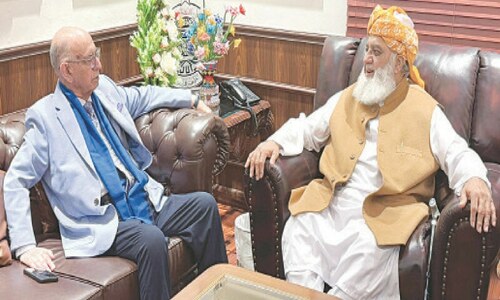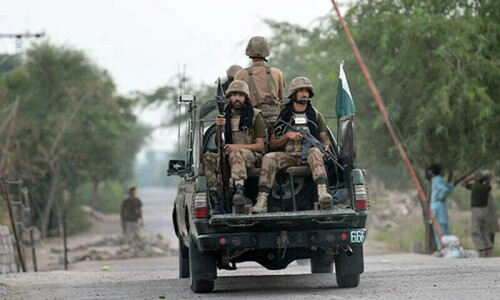KARACHI, Nov 12: The journey has been central to the development of spirituality in Islam in both its spiritual and physical manifestations, as mystics and scholars have crisscrossed the world in search of truth.
This was stated by German scholar Dr Jurgen Wasim Frembgen at the launch of his book Journey to God: Sufis and Dervishes in Islam at the Goethe-Institut on Wednesday. Dr Frembgen is the chief curator of the oriental department at the Museum of Ethnology in Munich while he also lectures at various universities in Germany and Pakistan.
“The journey is very important in Islam. The tariqah is the journey of the body and the mind towards the infinite. It is the way of the seeker in search of divine Truth and annihilation in God. Shaikh Fariduddin Attar in his Musibat Nameh and Mantiq at-Tayr, Rumi and Iqbal have all discussed this journey.
“The journey has also taken place in the world of matter, in this world. Sufis have crisscrossed the world. They have gone to Makkah and Madina for knowledge. The Ulama, traders and missionaries have also travelled. The journey has opened new horizons of the mind,” said Dr Frembgen.
He said the eastern lands of Islam had been neglected in the European mind as there was a misconception that only Arabs populated the Muslim world.
Dr S. Mehdi Raza Shah Subzwari, Sajjada Nashin of the shrine of Hazrat Lal Shahbaz Qalandar at Sehwan, recalled his association with Dr Frembgen, saying that the German scholar had spent a decade tracing the dervishes and dargahs of Pakistan. He said this interaction, coupled with his exhaustive studies, had given him a deep insight into the subject.
Dr Subzwari said there was a misconception among common people that Sufis and dervishes were illiterates known more for their far-fetched feats rather than their wisdom and scholarship. He disagreed with this generalization and offered the example of Hazrat Uthman Marwandi, better known as Lal Shahbaz Qalandar, whom he described as a “learned saint.”
He said the Qalandar had authored four textbooks on religious philosophy over 700 years ago which had been taught in the madressahs of Sindh for centuries. He claimed that even Ibn Battuta, the famed North African traveller of the 14h century, had visited Sehwan and had praised the madressah in the city of the Qalandar for its level of scholarship. He was reported to have said that a student had come to Sehwan from as far away as the Egyptian port of Alexandria.
“Sufis contributed greatly to Islam. Take away their contributions and very little is left,” said the Sajjada Nashin.
Dr Marcus Litz, director of the Goethe-Institut, said that Sufism was the “spiritual bridge” that linked Christianity and Islam, while Ameena Saiyid, director of OUP, publishers of the book, said that there was a need to promote European scholarship, as opposed to just British or American, and that Pakistan needed to be promoted from different perspectives.—QAM












































Dear visitor, the comments section is undergoing an overhaul and will return soon.